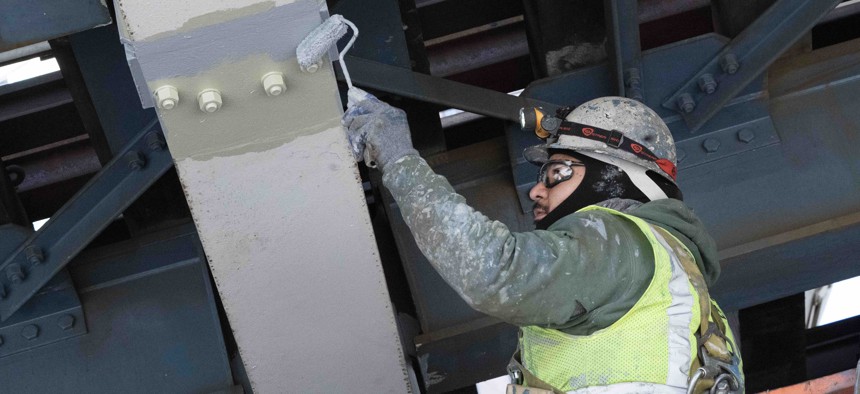Biden on Infrastructure: ‘We Will Not Be Open to Doing Nothing’

A painter works on steel support beams underneath the Manhattan Bridge, part of New York's aging infrastructure, April 6, 2021. AP Photo/Mark Lennihan

Connecting state and local government leaders
The president also emphasized he is prepared to have talks with Republicans about his proposed spending package.
President Biden on Wednesday made clear that he is willing to negotiate with Republicans about the infrastructure package he has proposed, including how to pay for it, but he also dismissed the notion that the U.S. could continue to put off investing in public works and other areas that are part of his plan.
Senate Minority Leader Mitch McConnell and other Republicans, have so far been unsupportive of the president’s roughly $2 trillion proposal. The White House wants to raise the corporate tax rate and to capture more tax revenue from companies’ overseas earnings to help fund the plan. GOP lawmakers and some business groups are against the proposed changes to the tax code.
“Debate is welcome. Compromise is inevitable. Changes are certain. In the next few weeks, the vice president and I will be meeting with Republicans and Democrats to hear from everyone. And we’ll be listening, we’ll be open to good ideas and good-faith negotiations,” Biden said.
“But here’s what we won’t be open to: We will not be open to doing nothing. Inaction simply is not an option,” he added.
Critics say Biden’s plan is too sprawling and covers areas that are far afield from roads and bridges and other traditional public works. For example, parts of it focus on areas like addressing climate change and expanding access to long-term care services under Medicaid.
"I think it's a big mistake for the administration," Sen. Roy Blunt, a Missouri Republican, said while discussing the proposal on Fox News over the weekend.
"I also think it would be an easy victory if we go back and look at roads and bridges and ports and airports and maybe even underground water systems and broadband. You'd still be talking about less than 30% of this entire package, and it’s an easily doable 30%,” Blunt added.
But Biden and others are pushing back against the notion of taking a narrower view of infrastructure, arguing that the U.S. is at a moment where it needs to make historic levels of investment in public works and other domestic priorities, including nondefense research and development, in order to remain competitive with other countries, particularly China.
“We don’t just fix for today, we build for tomorrow. Two hundred years ago, trains weren’t traditional infrastructure either until America made a choice to lay down tracks,” he said.
“To automatically say that the only thing that’s infrastructure is a highway, a bridge or whatever, that’s just not rational. It really isn’t,” he added.
Biden specifically called out high-speed internet as an area that is in need of upgrades, along with the electric grid and water systems.
The president made his remarks during a speech in Washington, D.C. Earlier in the day, the Treasury Department released a 19-page document providing additional information on his tax proposals, which the administration says would pay for the plan over a 15-year timeframe.
The White House is making a case that corporate taxes have fallen as a share of the nation’s economic output and that Republicans went too far when they cut corporate taxes with their broad overhaul of the federal tax code in 2017. That tax law rewrite dropped the top corporate tax rate to 21% from 35%. Biden is proposing to push it back up to 28%.
His plan also includes provisions to roll back what the White House describes as tax “incentives” for companies to shift profits and production abroad. And it seeks to change tax laws so they’re more favorable to renewable energy production, rather than fossil fuels, like oil and coal.
Democrats hold just a one-vote advantage in the U.S. Senate and Sen. Joe Manchin, of West Virginia, is a key moderate vote for the party. Earlier this week, during an interview with his home state’s MetroNews Talkline he indicated that he does not support raising the corporate tax rate to 28% and suggested that he favored a rate of 25%.
The U.S. Chamber of Commerce has advocated for a sizable federal infrastructure package even before Biden was elected.
But last week the leading business group called the president’s proposal “dangerously misguided,” when it comes to how it would be paid for. The chamber registered its strong opposition to general tax increase proposals and instead says revenue for a package should come from “users who benefit from the investment.”
Amazon CEO Jeff Bezos, meanwhile, this week said that he is supportive of raising the corporate tax rate and new infrastructure investment.
Biden said Wednesday that while he’s open to discussing other revenue options, he would not get behind any plan that raises taxes on people earning less than $400,000 annually.
Bill Lucia is a senior editor for Route Fifty and is based in Olympia, Washington.

NEXT STORY: Facing wave of retirements, Connecticut looks to digitization for efficiency and savings





